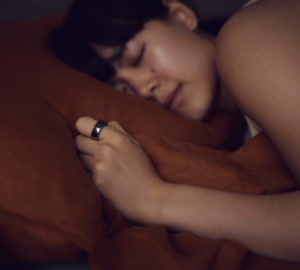Back-to-school season can be a shock to the system, for children, teens, and yes, even adults. As we go back to classes, the office, or just adjust to a new schedule, this time of year ushers in lots of changes—including (much) earlier bedtimes and wakeup times.
During the summer, our schedules are typically less structured—we have more free time, we may travel more often, and those 8am classes or meetings are a distant memory, says Rebecca Robbins, PhD, sleep researcher and Oura advisor. Then, when it’s time to get back into a routine, your kids may react by pushing back on naps or resisting bedtime (“just 15 more minutes!”).
Insufficient Sleep Among Kids: A Troubling Trend
If this sounds familiar, you’re not alone. Research shows that sleep deprivation is a concerning trend among school-age children. One study found that about half (52%) of American children ages 6 to 17 get less than the 9 hours per night recommended by pediatricians.
Unfortunately, sleep deprivation can lead to a number of health issues for children, from behavioral issues and lack of motivation to long-term, chronic conditions such as obesity, high blood pressure, or diabetes. Plus, in the short-term, sleep plays a pivotal role in your child’s education.
The reason: Your brain needs quality sleep both before and after learning something new. First, it allows the brain to be more like a dry sponge than a waterlogged towel before learning—it’s ready to soak up new information. Secondly, sleep allows the brain to effectively hit the “save” button on new memories, preventing you from forgetting what you just learned.
To help prevent learning issues, among others, getting quality sleep is key for your entire family. Here, five must-know tips that’ll help you all prepare for a successful (and restful) back-to-school season.
READ MORE: The Neuroprotective Benefits of Sleep
5 Back-to-School Sleep Tips
1. Start shifting bedtimes earlier ASAP.
The number-one thing you can do, starting tonight? Transition your family’s sleep routine by shifting bedtime 15 minutes earlier every night until you reach the new ideal bedtime. (Check out this chart from the National Sleep Foundation to learn how much sleep your child needs at various ages.)
“Ideally, your child has one to two weeks to get accustomed to the new bedtime, then they’re on the new schedule for a couple more weeks before school starts,” Robbins says. “This will help them start the school year on the right foot.”
2. Maintain a consistent sleep schedule.
You may not realize it, but your body loves a routine. “We all have ‘internal clocks’—aka circadian rhythms—in our brains, which cue the release of hormones at certain times that allow us to get sleepy,” Robbins says. “When we go to bed later than usual, our brain and accompanying hormones get confused. Keeping a consistent sleep schedule allows our brain to understand when to relax and when to be alert.”
Your kids crave structure too, and providing a consistent schedule is one of the best things we can do as parents, Robbins says. “Sleep begets sleep in children, so kids who are in a routine and getting the sleep their growing bodies and brains need are better able to stay on schedule than those who might have skipped a nap or stayed up late the night before.”
3. “Re-brand” sleep.

If your children push back and bargain about bedtimes, work on repositioning sleep as an activity worthy of respect and admiration. Explain how important sleep is for learning and memory, and how it can help them in their other interests like playing a sport or a musical instrument.
For instance, if your child dreams of making it to the Olympics one day, introduce them to an athlete who’s vocal about the importance of sleep, like swimmer and Oura member Katie Ledecky! This can help position sleep as part of a routine that your kid can be proud of and maybe even look forward to, Robbins says.
4. Allow teens to get the sleep they need.
If you have to drag your teen out of bed to get to school on time (literally or figuratively), this could be a sign that they are not getting enough sleep. “This is surprisingly common among teenagers,” Robbins says. “While they need 8 to 9 hours at minimum, they can need up to 11 hours for optimal functioning—even more sleep than they needed in middle school.” This means they need to get in bed even earlier than they might think.
Moreover, teenagers’ circadian rhythms also shift during puberty. This makes it difficult to power down their brains before 11pm or 12am, preventing them from getting enough shuteye before their alarms go off, Robbins says.
While these developments haven’t been translated into policy changes on a large scale, there is a growing call among doctors and the scientific community for later school start times to adjust for this natural change in teens’ circadian rhythms. Read “The Sleep Doctor” Dr. Michael Breus’ take here.
5. Prep their space for success.
Following proper sleep hygiene is crucial for people of any age. Make sure to keep the bedroom as cool, quiet, and dark as possible to allow for optimal sleep.
Another essential element of sleep hygiene is to allow your family members plenty of time to wind down at night. A couple of hours before bedtime, lower the lights, put away the phones, and encourage everyone to calm their mind by reading or engaging in other relaxing activities, such as meditating or breathing exercises.
| Member Tip: Access 70 guided breathing exercises and meditations within Explore content on the Oura App. |
LEARN MORE: 10 Tips for Better, Deeper Sleep
About the Oura Expert
Rebecca Robbins, Ph.D., is a Sleep Scientist at the Brigham and Women’s Hospital and Assistant Professor of Medicine at Harvard Medical School where her research focuses on sleep and its effects on health and the design of novel behavioral interventions to nudge and navigate participants and communities toward better sleep, sleep disorders care, and overall health. Dr. Robbins has published extensively in the peer-reviewed literature and authored many book and encyclopedia chapters. She is the co-author of the book “Sleep for Success! Everything you must know about sleep but are too tired to ask.” She makes frequent media appearances on National television. She is dedicated to promoting the benefits of healthy sleep and empowering individuals to make positive changes in their sleep habits for better health and well-being.











